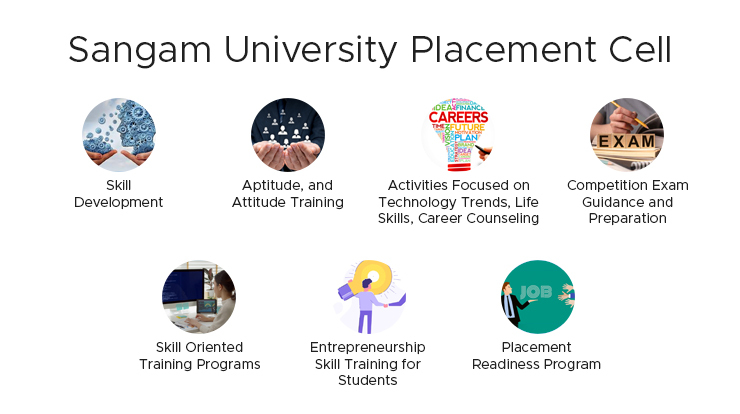One of the most significant milestones for engineering students is securing a job through campus placements. It’s a moment that reflects years of hard work, dedication, and learning. Yet, a successful campus placement doesn’t just happen by chance, it’s the result of a well-thought-out strategy from both the institution and the students. In this blog, we’ll explore tips to improve campus placement strategy, the key to crack the campus placements, and how universities can optimise their campus recruitment strategy to provide the best opportunities for their students. If you’re aiming to join a top university in Rajasthan, this guide will provide valuable insights.

Why is Campus Placement Important?
Campus placements serve as a bridge between academic life and the professional world. For many students, it’s the first real taste of the corporate world, and for companies, it’s a way to source fresh talent. A strong campus placement strategy not only benefits students by providing career opportunities but also boosts the institution’s reputation, attracting more students in the future.
Key Elements of a Successful Campus Placement Strategy
An effective campus placement strategy requires planning, collaboration, and understanding the current market trends. Here’s how to develop a strategy that ensures successful placements:
1. Industry Partnerships
One of the most crucial aspects of a solid campus placement strategy is building long-term relationships with various companies across industries. Universities must:
- Establish ties with leading corporations
- Hold regular industry-institute interaction events
- Encourage internships to give students hands-on experience
At Sangam University, the best university in Rajasthan, courses are designed in consultation with industry experts, keeping current trends and future market demands in mind.
2. Skill Development Programs
With the job market becoming increasingly competitive, the demand for highly skilled engineers has never been higher. Universities should prioritize:
- Soft skills training (communication, leadership, teamwork)
- Technical workshops and certifications in emerging technologies
- Personality development sessions
These programs make students more employable and prepared for interviews. Universities with strong skill development initiatives see higher placement rates.
3. Mock Interviews and Aptitude Tests
To help students understand what recruiters look for, mock interviews and aptitude tests should be an integral part of the placement preparation process. This practice allows students to:
- Get familiar with the interview format
- Understand typical questions and responses
- Improve their confidence and articulation
Mock interviews conducted by professionals give students a realistic idea of corporate expectations and prepare them for the actual placement process.
4. Company-Specific Training
Each company has its unique set of requirements. Tailored training sessions based on the companies coming for campus placements can give students a significant edge. This includes:
- Studying company profiles and their interview patterns
- Training for specific roles (such as software development, project management, etc.)
- Preparing for domain-specific challenges
For example, training sessions on data analytics or software development can be arranged based on the industry the company belongs to.
5. Networking and Alumni Support
Building a strong alumni network is invaluable for universities. Alumni working in top companies can offer insights and guidance to current students, helping them navigate the placement process. Universities should encourage alumni to:
- Participate in guest lectures and workshops
- Guide students through mock interviews and resume-building sessions
- Refer students for roles within their organisations
Universities with a well-connected alumni network have a higher placement rate as students benefit from these real-world connections.
What is the Key to Cracking Campus Placements?
While universities play a significant role, students must also take charge of their success. Here are some keys to cracking the campus placements:
- Know the company: Research the company thoroughly before the placement drive begins. Understand its core values, work culture, and job roles offered.
- Prepare a strong resume: A resume should be concise yet detailed, showcasing relevant skills and experiences. A well-crafted resume grabs the recruiter’s attention.
- Practice aptitude and technical skills: Aptitude tests are the first filter in most placements. Consistent practice in logical reasoning, data interpretation, and technical questions will give students an edge.
- Stay confident and composed: A confident approach during interviews and group discussions can make a big difference.
Enhancing Campus Recruitment Strategy
The campus recruitment strategy isn’t just about bringing companies to campus. It’s about creating a seamless process that matches students’ skills with the right employers. Here’s how universities can make their recruitment strategy more effective:
1. Collaborate with Diverse Industries
Engineering spans numerous fields—mechanical, civil, computer science, electrical, and more. Universities should ensure they collaborate with companies from a wide range of industries to offer diverse job roles. This creates more opportunities for students with varying skill sets.
2. Invest in Technology
A digital-first approach to recruitment has become essential. From online placement portals to virtual interviews, leveraging technology can streamline the placement process. Universities can use digital platforms to:
- Track student progress
- Connect with recruiters globally
- Conduct virtual placement drives
3. Continuous Feedback Loop
After each placement drive, collecting feedback from both students and companies is crucial. This feedback can help the university refine its approach and identify areas of improvement, leading to better placements in the future.
Conclusion
A well-planned and executed campus placement strategy is key to ensuring that engineering students find the right career opportunities upon graduation. Sangam University is one of the top private University in Rajasthan, offering not only excellent academic programs but also a robust placement strategy, ensuring students are well-prepared to meet the demands of the industry.
Whether you are looking to enrol in a university or seeking ways to boost your placement prospects, remember that placements are about more than just academics. It’s about the right strategy, preparation, and guidance. Ready to take the next step? Sangam University is here to help you achieve your career dreams.
FAQs
What are some tips to improve campus placement strategy?
Focus on skill development, build industry partnerships, and conduct mock interviews to better prepare students.
How can I crack the campus placements?
Preparation, research, strong resumes, and consistent practice in both technical and soft skills are essential to cracking campus placements.
Why are campus placements important for engineering students?
Campus placements provide direct access to job opportunities, helping students transition smoothly into the corporate world.
How does Sangam University prepare students for campus placements?
Through skill development programs, industry partnerships, and company-specific training, Sangam University ensures students are fully prepared.
What should a campus recruitment strategy focus on?
A recruitment strategy should focus on industry diversity, leveraging technology, and ensuring a continuous feedback loop for improvement.


